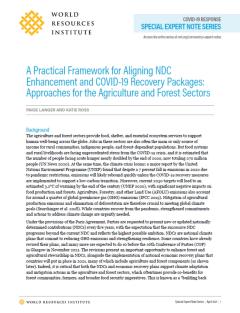
The food and agriculture sectors provide essential ecosystem services to billions of people across the globe. But the COVID-19 pandemic has put more stress on already vulnerable systems, exacerbating global food insecurity and deforestation. As countries begin their recoveries from the COVID-19 pandemic, recovery must include investments into climate mitigation and adaptation. Strengthening Nationally Determined Contributions (NDCs) and economic recovery plans go hand in hand and can provide crucial social and economic benefits.
NDCs are national climate plans that commit to reducing GHG emissions and strengthening resilience. The revisions present an important opportunity to enhance forest and agricultural stewardship in NDCs, alongside the implementation of national economic recovery plans that countries will put in place in 2021, many of which include agriculture and forest components.
Indeed, it is critical that both the NDCs and economic recovery plans support climate adaptation and mitigation actions in the agriculture and forest sectors, which oftentimes provide co-benefits for forest communities, farmers, and broader food security imperatives. This is known as a “building back better” approach, whereby new actions and investments are channeled toward a greener and more sustainable economic recovery. Building back better through agriculture and forest actions not only addresses economic and climate challenges but can also support many of the Sustainable Development Goals (SDGs).
The aim of this note is to show how NDC enhancement and economic recovery plans can intersect and reinforce each other to help countries’ economic recovery while addressing the climate crisis. This is one piece of a three-part series, with a specific focus on the agriculture and forest sectors. Other expert notes in the series address how economic recovery packages and NDC actions can be integrated in the power and transport sectors.
